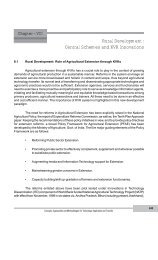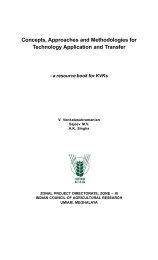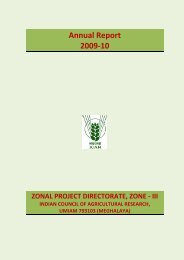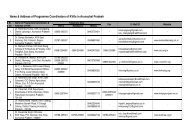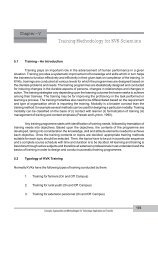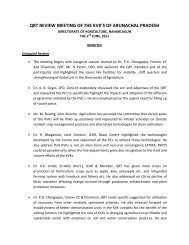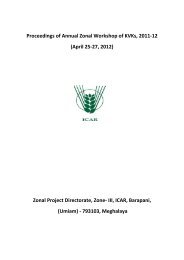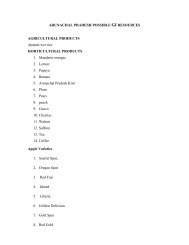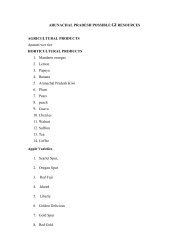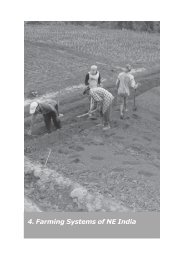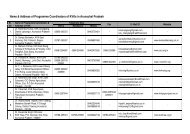Farming Systems Approach - ICAR, Zonal Project Directorate (Zone-III)
Farming Systems Approach - ICAR, Zonal Project Directorate (Zone-III)
Farming Systems Approach - ICAR, Zonal Project Directorate (Zone-III)
You also want an ePaper? Increase the reach of your titles
YUMPU automatically turns print PDFs into web optimized ePapers that Google loves.
Sajeev M.V, V. Venkatasubramanian & A.K. SinghaThe goal of farming system research is to understand farmer’s livelihood to consider the complexity ofthe real world in which farmers and farm families live and make decisions; to understand the complexityand diversity of farmer values and know-how. These influence their decision-making, their informationprocessing, their combination of activities on- and off-farm, and ultimately their design of productiveprocesses and the interaction with ecological processes. It is also intended to include multi-scaleapproaches, connecting the farm to the landscape, connecting the farm with the markets, the farmersand other rural stakeholders, livelihoods and territories. These interactions result in the diversity andheterogeneity of farming systems.The <strong>Farming</strong> <strong>Systems</strong> <strong>Approach</strong> (FSA), can be seen as a ‘school of thought’ that spans a wide range oftheories and methods. <strong>Farming</strong> systems approaches share a number of key elements, as they areinterdisciplinary in nature. <strong>Farming</strong> systems always combine natural and social sciences, e.g. agronomy,ecology, plant breeding, livestock sciences, economics, anthropology, rural sociology. FSA understandsthe farm and household as one system. This implies that much attention is given to interactions likethose between technical and social components and resource allocation decisions, biotechnical andecological processes. Also FSA have a dynamic approach: with on-going changes in publicpolicies, society’s expectations, market prices or local opportunities, research focuses on the ability offarmers to cope with uncertainty and complexity.Farmer participation is understood as crucial within the <strong>Farming</strong> <strong>Systems</strong> <strong>Approach</strong>. This is to understandfarmer’s goals and objectives, i.e. the coherence of farming practices; to ensure that scientific results(esp. from technical and biological sciences) are adapted and thus acceptable by farmers. Indeed,farmers are understood as the experts on the socio-economic factors (e.g. labour, values, goals, needs,preferences, social attitudes) that may constrain implementation, to produce knowledge about farmingsystems diversity and to produce tools that accompanies farmers on the pathways of change.Although the holistic approach of farming systems requires that the entire farm (as well as its natural,social, economic and policy environment) serves as analytical framework, in later stages of a specificresearch project, work usually focuses on specific components, subsystems or interactions. However,the focus on specific components or interactions should not undermine the farming systems approach.Indicators of a poor application of farming systems approach include: lack of systems perspective, lackof farmer-oriented attitude, lack of farmer participation, neglect of indigenous knowledge and genderissues, lack of involvement of extension and NGOs, lack of ecological sustainability, neglect of variationin time and space, lack of balance in breadth and depth of research, lack of interdisciplinarity. The factthat these weaknesses often occur in research is an indication of the difficulties met when implementingthe farming systems approach, not least due to the (institutional) emphasis on rapid results and costeffective research methods. How to better implement the holistic approach is a key area of furtherdevelopment within farming systems research.2<strong>Farming</strong> <strong>Systems</strong> of North East India



